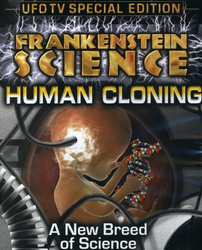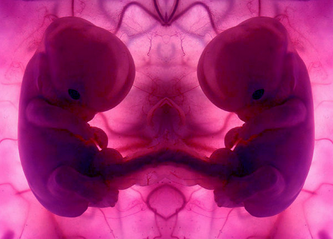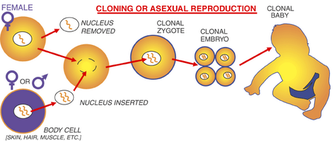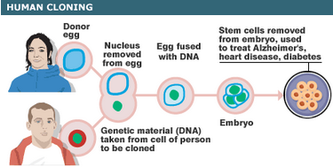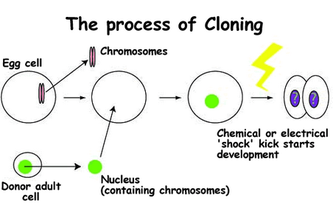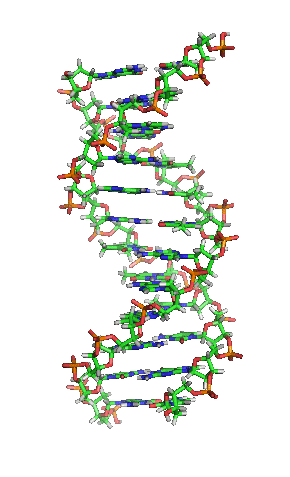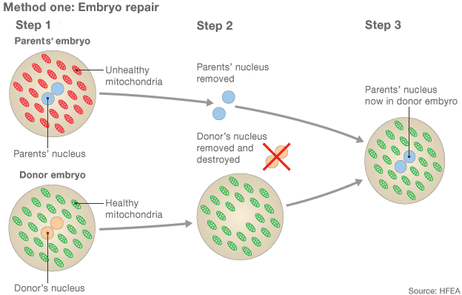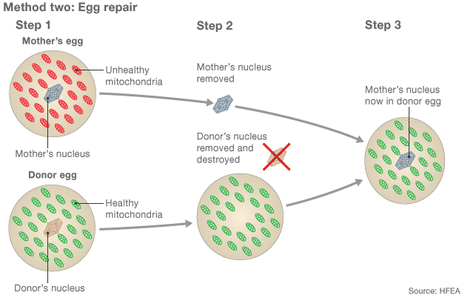Human Cloning
“The secret of DNA's success is that it carries information like that of a computer program, but far more advanced. Since experience shows that intelligence is the only presently acting cause of information, we can infer that intelligence is the best explanation for the information in DNA.”
― Jonathan Wells, The Politically Incorrect Guide to Darwinism And Intelligent Design
― Jonathan Wells, The Politically Incorrect Guide to Darwinism And Intelligent Design


How Human Cloning Will Work
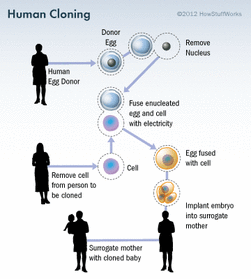


Embryonic stem cells: Advance in medical human cloning
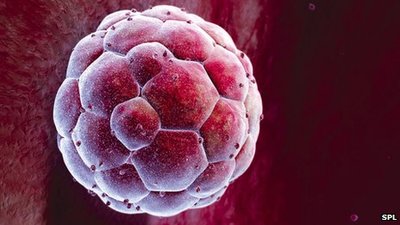

Human 'cloning' makes embryonic stem cells
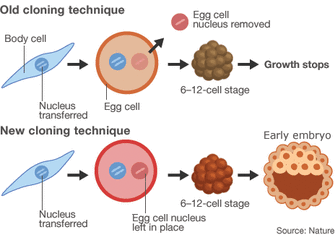

UK government backs three-person IVF

Scientists clone human embryos to make stem cells
In what is being described as a "significant milestone" for medicine, the team from Oregon Health and Science University successfully used a technique which utilised a human skin cell and a woman's egg to produce an embryo which was a genetic copy of the original skin cell.
The resulting embryos were then used as a source of stem cells, which can be used to create specialised tissue cells for transplant operations.
But scientists say they do not think the technique could be used to clone humans for reproductive purposes.
The resulting embryos were then used as a source of stem cells, which can be used to create specialised tissue cells for transplant operations.
But scientists say they do not think the technique could be used to clone humans for reproductive purposes.

I've cloned a human: Extraordinary claims of a doctor who 'has implanted embryos into four women'


Fertility expert: 'I can clone a human being'


Human liver grown inside a mouse
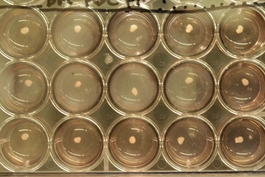

150 human animal hybrids grown in UK labs: Embryos have been produced secretively for the past three years
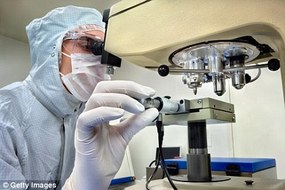

Scientists hit back at Catholic church over 'cybrids'

Human-Animal Cybrids

edible pharmacological crop HIV vaccines

ProdiGene receives grant for development of edible AIDS vaccine

Edible HIV vaccine breakthrough

HIV Vaccine From Engineered Plants: Mice Form Antibodies Against HIV Protein
May 18, 2009 — A research team at Örebro University in Sweden has succeeded in changing the genes in plants so they can function as a vaccine against HIV. Through gene modification the plants have acquired the capacity to produce a protein that is part of the virus, and the project has taken a giant step forward in that mice that have been fed the plants have reacted and formed antibodies against the protein.
The findings are presented in a new academic dissertation at the university. To produce drugs with the help of plants is a rapidly growing research field that offers new potential to combat diseases. At Örebro University researchers have the goal of developing inexpensive and safe protection against HIV, in the form of plants that contain a vaccine against the virus and can be cultivated all over the world. If they succeed, it will be difficult to exaggerate the significance of this for millions of people around the world, not least in the poorest countries.
The findings are presented in a new academic dissertation at the university. To produce drugs with the help of plants is a rapidly growing research field that offers new potential to combat diseases. At Örebro University researchers have the goal of developing inexpensive and safe protection against HIV, in the form of plants that contain a vaccine against the virus and can be cultivated all over the world. If they succeed, it will be difficult to exaggerate the significance of this for millions of people around the world, not least in the poorest countries.

ProdiGene Announces Milestone in NIH Collaboration for AIDS Vaccine; - Successful Expression of SIV Sub Unit Vaccine - - Important Step to Make a Future Edible AIDS Vaccine.
KEYSTONE, Colo. -- ProdiGene, Inc., a leader in the development and manufacturing of recombinant proteins in transgenic plant systems, announced here today at the Keystone Symposia, that it successfully expressed a sub unit vaccine in maize that is expected to produce an immune response to simian immunodeficiency virus (SIV), the primate equivalent to HIV which causes AIDS in people. The research is funded by an Innovation Grant program from the NIH Institute of Allergy and Infectious Disease's Office of AIDS Research (NIH/NIAID/DAIDS). The objective of the program is to develop a source of SIV gp120 protein, a key protein in AIDS research, as well as to establish a potential oral delivery system for an AIDS vaccine.
ProdiGene has successfully expressed SIV gp120 in its transgenic plant system, which now provides a source of the protein to be used in AIDS research. Additionally, ProdiGene scientists will begin animal studies this spring to confirm that ingesting the vaccine will induce an immune response against the virus. This constitutes a key stepping stone for moving into the expression of an HIV vaccine in a transgenic plant system. ProdiGene's long- range plan is to develop an oral delivery method for an AIDS vaccine.
"The search for an AIDS vaccine continues to advance aggressively," remarked Michael Horn, Ph.D., Senior Research Scientist and Project leader at ProdiGene. "Once we have the vaccine in hand however, we must be able to make it readily accessible to the populations that are in such dire need. ProdiGene's system promises to provide the edible, highly-scalable and cost effective vaccine option that can meet this demand."
Developing an edible vaccine against HIV is particularly critical because it has reached epidemic proportions, particularly in Sub-Saharan Africa and South and Southeast Asia, which together have more than one-half of all AIDS victims worldwide. In these areas, standard vaccines are not feasible because they lack the infrastructure to provide trained healthcare personnel and equipment, as well as the refrigeration, necessary for traditional injected vaccines.
ProdiGene, which announced receipt of the grant in November 2000, is working with a protein known as gp120, which is found on the surface of the SIV and HIV virus. Although gp120 may not be the ultimate vaccine used to develop an effective oral AIDS vaccine, expression of the protein using ProdiGene's technology helps provide the vaccine delivery system proof-of-concept sought by the NIH.
KEYSTONE, Colo. -- ProdiGene, Inc., a leader in the development and manufacturing of recombinant proteins in transgenic plant systems, announced here today at the Keystone Symposia, that it successfully expressed a sub unit vaccine in maize that is expected to produce an immune response to simian immunodeficiency virus (SIV), the primate equivalent to HIV which causes AIDS in people. The research is funded by an Innovation Grant program from the NIH Institute of Allergy and Infectious Disease's Office of AIDS Research (NIH/NIAID/DAIDS). The objective of the program is to develop a source of SIV gp120 protein, a key protein in AIDS research, as well as to establish a potential oral delivery system for an AIDS vaccine.
ProdiGene has successfully expressed SIV gp120 in its transgenic plant system, which now provides a source of the protein to be used in AIDS research. Additionally, ProdiGene scientists will begin animal studies this spring to confirm that ingesting the vaccine will induce an immune response against the virus. This constitutes a key stepping stone for moving into the expression of an HIV vaccine in a transgenic plant system. ProdiGene's long- range plan is to develop an oral delivery method for an AIDS vaccine.
"The search for an AIDS vaccine continues to advance aggressively," remarked Michael Horn, Ph.D., Senior Research Scientist and Project leader at ProdiGene. "Once we have the vaccine in hand however, we must be able to make it readily accessible to the populations that are in such dire need. ProdiGene's system promises to provide the edible, highly-scalable and cost effective vaccine option that can meet this demand."
Developing an edible vaccine against HIV is particularly critical because it has reached epidemic proportions, particularly in Sub-Saharan Africa and South and Southeast Asia, which together have more than one-half of all AIDS victims worldwide. In these areas, standard vaccines are not feasible because they lack the infrastructure to provide trained healthcare personnel and equipment, as well as the refrigeration, necessary for traditional injected vaccines.
ProdiGene, which announced receipt of the grant in November 2000, is working with a protein known as gp120, which is found on the surface of the SIV and HIV virus. Although gp120 may not be the ultimate vaccine used to develop an effective oral AIDS vaccine, expression of the protein using ProdiGene's technology helps provide the vaccine delivery system proof-of-concept sought by the NIH.
Your browser does not support viewing this document. Click here to download the document.
